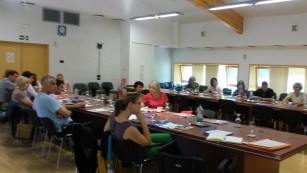 Over the course of nearly seven decades, December 10, the International Human Rights Day, has been an occasion on which to point out the significance of human rights and the obligation of today's states to provide for general observance and exercise of human rights and freedoms. This day is also an occasion to reflect on the significance of acknowledging the innate dignity and equal, inalienable rights of all members of the human family as foundations of freedom, justice and peace in the world, as stated in the Univeral Declaration of Human Rights, especially concerning the achieved level of their esercise in a given society. It is particularly relevant when it comes to assessing the state of human rights, above all as related to the significance of their further development by means of strengthening institutions. Without developing and proper functioning of adequate institutional mechanisms for human rights esercise, protection and development, human rights would remain a dead letter.
Over the course of nearly seven decades, December 10, the International Human Rights Day, has been an occasion on which to point out the significance of human rights and the obligation of today's states to provide for general observance and exercise of human rights and freedoms. This day is also an occasion to reflect on the significance of acknowledging the innate dignity and equal, inalienable rights of all members of the human family as foundations of freedom, justice and peace in the world, as stated in the Univeral Declaration of Human Rights, especially concerning the achieved level of their esercise in a given society. It is particularly relevant when it comes to assessing the state of human rights, above all as related to the significance of their further development by means of strengthening institutions. Without developing and proper functioning of adequate institutional mechanisms for human rights esercise, protection and development, human rights would remain a dead letter.
Deaspite the fact that the Universal Declaration does not perceive citiyens' rights and freedoms as big. vs. small ones, older vs. newer, more or less important, the possibilities of their exercise, protection and development are still more accessible to certain social groups ove others. People living in fear for their lives or their family's existence due to a disaster, poverty, illness, their age, gender or minority group status are still numerous. Bearing this in mind, it is questionable whether these individuals could essentially be labelled free and equal in their dignitiy and rights.
The level of development of social consciousness concerning human rights is directly proportional to a society's attitude towards those facing most difficulties in their exercise and protection. However, the measure to which, as stated in Article 1 of the Universal Declaration, endowed with reason and conscience we act towards one another in a spirit of brotherhood sould also be considered a reflection of the level of social responsibility. On the International Human Rights Day we should remember that, in case of citizens, this responsibility is either individual or collective, whereas in a society perceiving itself as a contemporary one it is primarily reflected in functioning of its institutions.
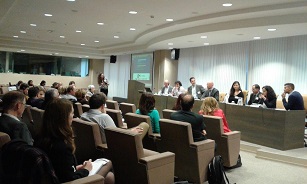 The closing conference of the VET4 Mediation with Roma Project, which the Provincial Protector of Ctizens - ombudsman (PPCO) has been supporting for the last two years, was held last Tuesday at the seat of the Belgian Ministry of Employment in Brussels. This international project has been implemented in five European countries with an aim to promote mediation in local communities with significant proportion of Roma population, as well as to build the capacities of women and men mediators by means of training and facilitating their engagement in their local communities.
The closing conference of the VET4 Mediation with Roma Project, which the Provincial Protector of Ctizens - ombudsman (PPCO) has been supporting for the last two years, was held last Tuesday at the seat of the Belgian Ministry of Employment in Brussels. This international project has been implemented in five European countries with an aim to promote mediation in local communities with significant proportion of Roma population, as well as to build the capacities of women and men mediators by means of training and facilitating their engagement in their local communities.
The participants from around ten European countries had a chance to learn about the Belgian experience concerning Roma inclusion and integration by using community mediation. In their introductory speeches these topics were presented by, amongst others, Philippe Courard, President of the French Community Parliament in Belgium, Valeria Atzori drom the European Social and Economic Commitee, Laetitia Gigot from the Wallon Ministry of Welfare, along with two representatives of civil society organizations (CSOs): Kim Janssens from the Minderheiden Forum and Ahmed Akhim from the Roma and Travellers Mediation Centre in Wallonia.
After the presentation of the VET4 Mediation with Roma Project Consortium partners had presented its results and activities implemented in Belgium, Italy, Romania, Serbia and Spain, it was the turn of Maria Grapin, the Romanian MP with the Eruopean Parliament and a member of its Social Development group. The last conference session was dedicated to the experiences of the project trainees, Roma mediators, as well as that of the activists of Belgian and French CSOs working in intercultural mediation field for years back.
The conference was concluded by Jan Jarab from the UN Office of the High Commissioner for Human Rights. He supported the efforts of the VET4 Mediation with Roma Project and other similar initiatives to foster mediation between vulnerable social groups and authorities in a way that would provide for affirmation of the so-called natural mediators from marginalized social groups as competent experts in establishing, maintaining and developing communication between those communities and the institutions.
 The Inspection Department of the city administration is undertaking all proscribed measures in its jurisdiction in order to properly secure all vacant buildings in the City of Novi Sad, protecting thus the citizens from danger of injury or disease they are exposed to when in their vicinity. This claim is the gist of a response of the Construction and the Communal Systems Inspection Sections of the city administration to the Provincial Protector of Citizens - Ombudsman (PPCO) regarding the measures undertaken in case of the vacant apartment building in 59, Alekse Santica St. in Novi Sad. However, the question is whether these measures are sufficient and what to until the regulations have been changed?
The Inspection Department of the city administration is undertaking all proscribed measures in its jurisdiction in order to properly secure all vacant buildings in the City of Novi Sad, protecting thus the citizens from danger of injury or disease they are exposed to when in their vicinity. This claim is the gist of a response of the Construction and the Communal Systems Inspection Sections of the city administration to the Provincial Protector of Citizens - Ombudsman (PPCO) regarding the measures undertaken in case of the vacant apartment building in 59, Alekse Santica St. in Novi Sad. However, the question is whether these measures are sufficient and what to until the regulations have been changed?
In its response, the Communal Section states that its staff has inspected this building on 9 February. It established that the plumbing had not been installed and connected to the city water supply and sewage system. There are sewage utility holes in from of the buildings with technically functional covers, but the entrances into the basement of the building had not been secured since it is the responsibility of the future tenants. The inspection concluded that it is a private property, so there are no legal grounds to initiate either administrative proceedings or to issue an official order to eliminate these irregularities.
Construction of this building started in 1991. It has still not been finished and construction has not been continuing for years now. The inspection established that there are no cracks in its facade, no pieces are crumbling from it, and stated that there is no danger for the passers-by in this respect. The investor installed wooden planks and barriers at the ground floor entrances and keeps checking and repairing them from time to time. Knowing that the building is frequented by homeless people, the inspection also addressed the police.
From the aspect of authorities having the power to do anything concerning this building, the key fact is that its legalization is in progress. The Legalization Law proscribes that demolition of constructed, fully or partially reconstructed buildings without a proper permit will not be implemented by the day this Law comes in force, namely before all legalization related proceedings have been finished and until consequential rulings have come into force. It means that the construction inspection has no authority to order demolition of such buildings.
There are over 90 vacant buildings and construction sites only within the city limits of Novi Sad. The PPCO holds that local authorities in charge, esp. in urban areas, should find a way to minimize the risks for citizens arising from such buildings and/or to eliminate them. The construction inspection should be done more often in order to establish whether there are unsecured ground-floor or basement entrances into it making the environment around it unsafe. The authorities in charge should also sanction investors and construction companies not undertaking proper security measures in such buildings, their surroundings and neighboring buildings, as well as measures concerning the traffic and environment proscribed by the Urban Planning and Construction Law.
Bearing in mind that the Buildings Legalization Law was passed in November 2013, as well as that the deadline for amending documentation for a later issuing of a construction permit expired on 30 April this year, it is beyond any doubt that the Urbanism and Residence Administration of the City of Novi Sad is bound to officially discard the incomplete legalization request for the building at 59, Aleksa Santic St. in Novi Sad. However, slow administration in this and other similar cases only procrastinates solving problems of citizens living in the vicinity of vacant buildings.
From 2003, when the Planning and Construction Law was passed, to coming into force of the Buildings Legalization Law in 2013, the legislator provided a period long enough for legal settlement of all issues concerning property and buildings to both the local authorities in charge and unconscientious investors, but there was no expected result. The building in question is an example of regulations concerning legalization of buildings constructed without a proper building, aka usage permit not producing positive effects both due to the regulations themselves and inefficient action of the local authorities. These facts prevents the Construction Section action and issuing an order to unconscientious investors to eliminate such buildings, which implies that such a state provides for an environment conducive to (continuing) construction of buildings without necessary permits and other legally required documentation. Legal uncertainty concerning the issue of vacant buildings and construction sites is boosted by the announcements of passing a new Buildings Legalization Law.
The State Administration Law proscribes that public authority holders are liable for all damage resulting from their illegal or irregular work while acting on behalf of any authorities caused to all individuals or legal entities. Concerning the 59, Aleksa Santic St. building, as well as all other unsecured and vacant buildings and construction sites, it is necessary for the City of Novi Sad to undertake all measures proscribed by specific laws in order to find a way to secure these buildings in way that they would no longer jeopardize citizens' health and safety.
 Towards the end of 2014 and at the beginning of 2015, the Provincial Protector of Citizens - Ombudsman (PPCO) conducted a research study on the implementation of the right of a child, aka pupil to personal assistance. A total of 35 (out of 45) local self-government units in Vojvodina answered the questionnaire sent to them by mail. By the time the study had been completed, only six of these units - besides already having general local regulations tackling this issue - had passed special rulebooks on regulating particularly the issue of engagement of personal assistant and which had been harmonized with the rulebooks of the relevant Ministries (welfare and education).
Towards the end of 2014 and at the beginning of 2015, the Provincial Protector of Citizens - Ombudsman (PPCO) conducted a research study on the implementation of the right of a child, aka pupil to personal assistance. A total of 35 (out of 45) local self-government units in Vojvodina answered the questionnaire sent to them by mail. By the time the study had been completed, only six of these units - besides already having general local regulations tackling this issue - had passed special rulebooks on regulating particularly the issue of engagement of personal assistant and which had been harmonized with the rulebooks of the relevant Ministries (welfare and education).
Regulating the issue of providing continuous personal assistance to children and pupils is significant because it is a precondition to exercise of basic children's rights. Anything concerning this right that welfare and education laws and by-laws do not regulate more particularly is left to resourcefulness, creativity, organization skills and abilities of the local self-government units, as well as parents and caretakers of children in need of such support. Insufficient regulation in this field causes many inconsistencies which, besides preventing children's rights exercise, could lead to procedural irregularities with the relevant authorities or failure to observe regulations in force. These problems go hand in hand with a lack of, namely failure to plan funds for personal assistance in the local self-government units' budgets, while in several units there are either no legal entities providing such a service or they have not been recognized as such. For instance, the study indicates that in half of the polled local self-government units personal assistants are often parents or close relatives of the beneficiary child, though the Rulebook on Particular Conditions and Standards for Provision of Welfare Services proscribes that a member of a beneficiary child's household cannot be considered a personal assistant.
Since the existing regulations do not cover either the qualification criteria for personal assistants (e.g. education, skills and personality) or the amount of remuneration for their work, the PPCO holds that such issues should be regulated at the national level. This way, local self-government units would have unified and clear preconditions for further regulation of major issues in this field, as well as an obligation to choose the best personal assistants and compensate for their services. This is particularly important because a child, aka a pupil needs continuous support.
The right of a child, aka pupil to personal assistance is a form of supplementary support, but it cannot be treated arbitrarily or considered secondary to other rights in the context of supporting a child in education and his/her everyday life. The purpose of this right is to provide a child as much independence and productivity as possible while meeting his/her personal needs, doing its everyday activities and fulfilling its duties, facilitating thus his/her communication with his/her environment and preventing or eliminating the consequences of social exclusion. At the same time, personal assistance is an indirect support to parents, families, teachers and schools. On condition that it is provided in an adequate way, this kind of support influences the quality of life of everyone involved quite significantly, creating more space for their increased dedication both to the child and their own personal and professional roles.
The report based on the research study ' The Right of a Child and Pupil to Personal Assistance', including the measures the PPCO suggested to the authorities in charge, is to be found on the PPCO website 9In Serbian).
 Torture and other forms of inhuman and degrading treatment could happen anywhere, but they are especially severe if happening to people with limited freedom of movement. Among those people are some of the beneficiaries of welfare facilities. The current state of affairs concerning the formal and legal framework for limiting their freedom of movement and running subsequent proceedings, esp. in situations when, due to a medically induced condition, they could harm themselves or other people, is conducive to human rights violations.
Torture and other forms of inhuman and degrading treatment could happen anywhere, but they are especially severe if happening to people with limited freedom of movement. Among those people are some of the beneficiaries of welfare facilities. The current state of affairs concerning the formal and legal framework for limiting their freedom of movement and running subsequent proceedings, esp. in situations when, due to a medically induced condition, they could harm themselves or other people, is conducive to human rights violations.
Welfare facilities in the Republic of Serbia, aka the Autonomous Province of Vojvodina, do not have a special rulebook for implementation of physical restraint and isolation measures of beneficiaries whose health status is such that they could harm themselves or others in their immediate surroundings. In order to establish to what degree these measures are implemented under the circumstances, who decides on it, as well as whether the beneficiaries' official representatives and other institutions in charge are being informed about them, the Provincial Protector of Citizens - Ombudsman (PPCO) conducted a research survey entitled 'Implementation of Physical Restraint and Isolation Measures in Welfare Facilities in AP of Vojvodina'.
The survey has been conducted in 25 welfare facilities, aka homes housing various beneficiaries (the elderly, children, people with psychiatric conditions, as well as those with mental and sensory disabilities) in Vojvodina. Its results indicate that more restrictive measures of physical restraint and isolation of beneficiaries are used relatively rarely or only as the last instance in cases of people whose behavior could be harmful to themselves or others. The survey has also showed that the decision-making procedures and the way of implementation of these measures differ from one facility to another.
'All this time, welfare institutions lack a clearly defined rulebook on the measures of treating agitated beneficiaries and it is a major problem. Inconsistencies in this field have led to a general feeling of insecurity of employees in immediate contact with beneficiaries,' says the general manager of one of the facilities providing inputs for the survey. Considering various needs and health conditions with elderly population, the interviewees also hold that it is justified and absolutely necessary for measures of physical restraint and isolation of people in welfare facilities to be regulated by a specific welfare-related document.
'The legislation introduces clear rules - mandatory and equal treatment according to proscribed norms. It provides for minimum mistakes,' says one of the interviewees. Lacking an adequate rulebook pertaining to welfare, the PPCO did the survey referring to the provisions of the Rulebook on Specific Conditions for Implementation of Measures of Physical Restraint and Isolation of People with Mental Disabilities Treated in Psychiatric Institutions. However, this rulebook regulates procedures in healthcare facilities and relates to only one specific category of beneficiaries, meaning that it is not entirely relevant for and applicable in welfare institutions.
Besides lacing a proper rulebook, the interviewees indicated that the question of institutional placement of people with a mental disability (of usu. moderate degree) and in need of psychiatric treatment beside it is still unresolved. Serbia has no facilities for adequate institutional housing such people, so they usually get portrayed and categorized as people with a severe degree of mental disability and placed in any of the available welfare facilities, regardless of the fact that the existing facilities are objectively not in a position to provide them with an adequate treatment.
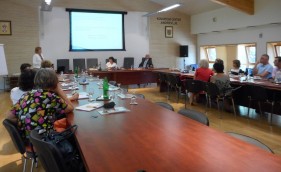 Last week, a two-day training for representatives of six local self-governments in Vojvodina named on gender equality and disaster risk reduction was held in Andrevlje. It was a part of the Gender Equality and Disaster Risk Reduction project implemented by the Provincial Protector of Ctizens - Ombudsman (PPCO) supported by the United Nations Entity for Gender Equality and the Empowerment of Women (UN Women).
Last week, a two-day training for representatives of six local self-governments in Vojvodina named on gender equality and disaster risk reduction was held in Andrevlje. It was a part of the Gender Equality and Disaster Risk Reduction project implemented by the Provincial Protector of Ctizens - Ombudsman (PPCO) supported by the United Nations Entity for Gender Equality and the Empowerment of Women (UN Women).
The aim of the training was to increase the level of knowledge and build capacities of the local self-governments to include gender perspective in documents and programs relating to disaster management. Participants from Subotica, Pancevo, Sremska Mitrovica, Vrbas, Secanj and Beocin had an opportunity to address the role of women and including the gender perspective in the field of disaster risk reduction and sustainable development.
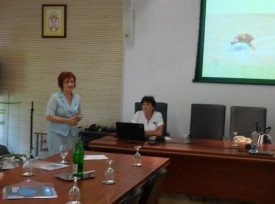 Ivan Baras, Assistant Head of the Disaster Management Section of the Ministry of Interior Affairs, talked about policy changes in the in this field. Besides the significance of disaster risk assessment in every local self-government, Baras pointed out that, in the future, more attention should be paid to education of people in charge of disaster management, as well as awareness-raising with the general population, with special emphasis on gender equality. Nada Lazic, an MP in the Serbian Parliament, stressed the link between environment protection and disaster management, referring also to the relevant policies. Based on the analysis of practice in some of the local self-government units in Vojvodina, Vesela Radovic, PhD, the Dean of the Security School with the EDUCONS University, pointed to the need for harmonizing the standards and practice with that of the EU while changing the national policies. She also talked about the significance of sustainable funding and monitoring of the planning and implementation of disaster management activities.
Ivan Baras, Assistant Head of the Disaster Management Section of the Ministry of Interior Affairs, talked about policy changes in the in this field. Besides the significance of disaster risk assessment in every local self-government, Baras pointed out that, in the future, more attention should be paid to education of people in charge of disaster management, as well as awareness-raising with the general population, with special emphasis on gender equality. Nada Lazic, an MP in the Serbian Parliament, stressed the link between environment protection and disaster management, referring also to the relevant policies. Based on the analysis of practice in some of the local self-government units in Vojvodina, Vesela Radovic, PhD, the Dean of the Security School with the EDUCONS University, pointed to the need for harmonizing the standards and practice with that of the EU while changing the national policies. She also talked about the significance of sustainable funding and monitoring of the planning and implementation of disaster management activities.
The participants attended sessions on gender equality and its indicators, as well as the needs of women and men from the public security perspective. Besides geneder analysis, the training covered issues of disaster risk assessment from a gender perspective and introduction of a gender component in the local self-government documents, along with mapping of collaboration interest in risk assessment and disaster response. The results of a desktop study on the disaster management practice from gender perspective in Vojvodina done by the PPCO within the frame of the Gender Equality and Disaster Risk Reduction project have also been presented during the training.
 In 2015, the Provincial Protector of Citizens - Ombudman (PPCO) Gender Equality Department will deal with the role of women and observance of the gender perspective in the field of disaster risk reduction by implementing the Gender Equality and Disaster Risk Reduction project with the support of UN Women.
In 2015, the Provincial Protector of Citizens - Ombudman (PPCO) Gender Equality Department will deal with the role of women and observance of the gender perspective in the field of disaster risk reduction by implementing the Gender Equality and Disaster Risk Reduction project with the support of UN Women.
The aim of the project is to raise the level of knowledge and capacity of the local self-governments and citizens' associations on inclusion of the gender perspective in the documents and programs pertaining to disasters and sustainable development, as well as to increase women's participation in decision-making processes when adopting such documents, to promote gender equality and non-discriminatory action in the official proceedings concerning disaster risk reduction. The project will be implemented in collaboration with the six local self-governments in Vojvodina, where discussions and focus groups will be held with the representatives of local authorities and women from the local communities.
During these field visits, the Deputy Ombudswoman will also discuss citizens' complaints and the state of human rights with individuals claiming their violation, inform them about the proper way to exercise them or ask for their protection and file their complaints concerning the work of the local and provincial public services with the PPCO.
 Every year, the Provincial Protector of Citizens - Ombudsman (PPCO) has a significant number of complaints concerning children's rights protection or exercise. Acting upon such complaints implies communication with various institutions and public services, including gaining access to and insight into confidential documents. Disclosing their contents would be contrary to the privacy protection principle and a violation of the professional secret protection obligation.
Every year, the Provincial Protector of Citizens - Ombudsman (PPCO) has a significant number of complaints concerning children's rights protection or exercise. Acting upon such complaints implies communication with various institutions and public services, including gaining access to and insight into confidential documents. Disclosing their contents would be contrary to the privacy protection principle and a violation of the professional secret protection obligation.
Knowing that PPCO handles such proceedings, a major number of citizens have been addressing our institution lately requesting insight into documentation containing information on the custody services activities concerning family affairs and mostly relating to issues of children's rights exercise or protection. The citizens have also been claiming their right to such information is based on the Free Access to Information of Public Interest Law and holding that the official correspondence between the welfare centers and the PPCO contains such information, which is not the case.
According to this Law, information of public significance is that with a public authority; it originates/results from its work or is related to it, contained in a document and relating to anything the public has a justified interest to know about. Citizens' requests for access to information relating to family issues, but which they personally hold to be of public interest, are not legally grounded. Information with any public authority, service or institution - including the PPCO - acquires during proceedings concerning children's rights protection and exercise, aka family affairs, cannot be considered information of public interest because there is no justified interest of the public to know how the proceedings were handled in individual family disputes.
The PPCO hereby draws public attention to the fact that authorities in charge of family issues proceedings are bound to observe the privacy principle. The Family Act also regulates that proceedings concerning family issues (marital and disputes concerning relationships between parents and children) are not public. Data from court documents are also considered a professional secret and all participants in the proceedings having access to such data are bound to observe it. Observing thus also the child's best interest principle, they are acting to prevent its and possible children's rights violation as well.
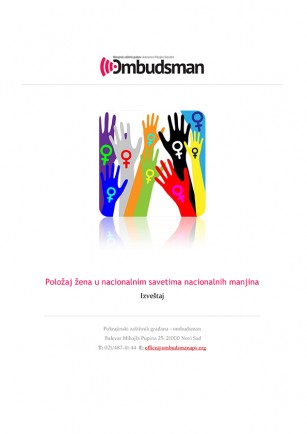 The Provincial Protector of Citizens - Ombudsman (PPCO) conducted a new research study on the position of women in the National Minority Councils (NMCs). The aim of the study was to establish whether the legal obligation of nominating 30 percent of the less represented gender on the voting lists was observed during the NMC elections in October 2014, as well as how many women are members of today's NMCs.
The Provincial Protector of Citizens - Ombudsman (PPCO) conducted a new research study on the position of women in the National Minority Councils (NMCs). The aim of the study was to establish whether the legal obligation of nominating 30 percent of the less represented gender on the voting lists was observed during the NMC elections in October 2014, as well as how many women are members of today's NMCs.
The results indicated that the number of women in NMCs has increased slightly. There are currently 106 women in NMCs, eight more than in the previous term. On average, women constitute somewhat more than a third of the NMC membership. Out of 14 NMCs that responded to the PPCO questionnaire, two have less than 30 percent women members. Another two have over 40 percent women members, whereas another three have less than 40 percent women. In their previous term, NMCs had almost three times more men than women - 93 cf. 39 respectively.
Two NMCs have a woman president. Nine have women vice-presidents, while men are nearly twice as represented in leading positions (e.g. 15 NMCs have men at the president's post). It is evident that difference of women cf. men decreases with the level of leadership, aka decrease in decision-making power within the NMCs. For instance, more women are at the post of the NMC secretary (seven women and two men). Women are more numerous than men only in the NMC executive services (36 cf. 14 repsectively).
Men are twice as numerous as women in the board president's role as well (27 cf. 14 respectively). Only the Education Boards have more women presidents (six women and fpur men).
Only three NMCs (Croatian, Macedonian and Slovak) have an organizational entity dealing with the position of women and protection of their rights.
Nine NMCs have done specific activities aimed at increasing the number of women in their decision-making and in politics in general prior to the NMC elections, whereas eight NMCs had campaigns for women to run for the NMC membership. Just like with the two previous research studies on the position of women in the NMCs, the PPCO points to the need for promoting women (in)to decision-making positions. NMCs should instigate women's engagement and inclusion in their ranks, organize gender equality and women's human rights trainings, as well as to contribute to the exercise of the gender equality principle in the society by applying it in their own activities.
 Despite obligations of the Republic of Serbia based on the ratified international human and minority rights documents, as well as on the Roma Decade, the position of Coordinators for Roma Issues (CRIs) with the local self-governments in the Autonomous Province of Vojvodina is still difficult, verging on grueling.
Despite obligations of the Republic of Serbia based on the ratified international human and minority rights documents, as well as on the Roma Decade, the position of Coordinators for Roma Issues (CRIs) with the local self-governments in the Autonomous Province of Vojvodina is still difficult, verging on grueling.
CRIs are often the only link between the local Roma community and the authorities, institutions and state services. Meetings with the local CRIs in the AP of Vojvodina have proved that a majority of them has been working at this post in municipalities part-time for several years back, which is contrary to regulations. A significant proportion of them are still not employed full-time with the local self-governments, despite their several years' part-time or volunteering engagement at this post.
Roma community members address CRIs mostly concerning ID and personal documentation provision, as well as exercise of their rights in the field of welfare and healthcare, education, employment and housing. This fact itself says enough about the level of information, knowledge, experience, professional training and responsibility this post imposes. Despite this circumstance, even CRIs employed full-time are often not in a position to acquire new or develop their existing professional skills relevant for their work to a sufficient extent or supported by competent professionals and experts.
Most local self-governments have still not adopted strategic documents, action plans and other legal acts in fields relevant for advancement of the position of the Roma. Detailed Regulation Plans, the most significant urbanism documents in the field of housing advancement and a base for long-term planning at the local self-government level, are just one example. Even if they have been adopted, they most often do not include the informal settlements or parts of formal settlements with a significant proportion of Roma dwellers. In several local self-governments it has been noted that the local authorities missed some opportunities for participation in bigger and longer-term projects, particularly in the field of infrastructure and housing, due to poor organization and planning, indicative also of a lack of sensitivity for the position of the Roma community.
Meetings with the CRIs with the local self-governments in AP of Vojvodina are a part of a field research study project of the Provincial Protector of Citizens - Ombudsman in the field of national minority rights protection. Once the project has been finished, its findings and results will be published in a report comprising recommendations to the authorities in charge concerning advancement of the position of the CRIs with the local self-governments.






